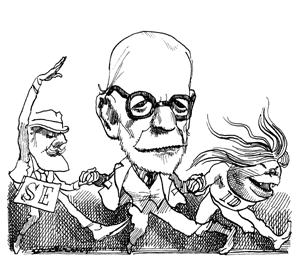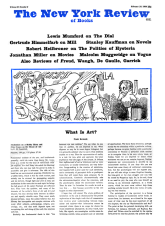Those who are bored by moral simplicity will find these letters dull. They cover thirty years of unbroken friendship and mutual admiration, which was founded on deep agreement about the fundamentals of psychoanalysis, and disagreement about many other topics. As such they are an invaluable corrective to the view of Freud given by others who disagreed with him: Jung, Adler, Rank. What is clear about the others is that they were unable to disagree with Freud without exhibiting an anxiety about it. By contrast, the Swiss clergyman Pfister clearly had no particular inclination to agree with Freud and therefore experienced no stress when he disagreed: he just happened to believe that on certain important questions Freud was right. This attitude evoked from Freud a touching warmth and objectivity.
Pfister was fortunate in his approach to psychoanalysis. As a Protestant pastor he had to cope with the emotional problems of his congregation, and thus found in psychoanalysis materials for the solution of problems which he had encountered independently. In this way he avoided the difficulties of those who acquire some acquaintance with psychoanalytic solutions first, and then carry the burden of having to accommodate their problems to the solutions. To place his analytic practice in a pastoral context meant that he had to deal with psychoanalytic questions in a situation somewhat different from that of the ordinary professional analyst. He thus probes familiar ground in an unfamiliar way.
But the interest of these letters at the level of analytic detail is minor; their greatest interest lies in the fact that they raise the question of the connections between psychoanalysis and ethics and religion. Both Pfister and Freud were straightforward and naive on this question. Freud believed that psychoanalysis rested on “the general scientific outlook, with which the religious outlook is incompatible.” Pfister believed that psychoanalysis was neutral between rival religious and moral systems and that theism was vindicated by metaphysical argument. Freud was not so much impatient with, as entirely lacking in interest in, the kind of philosophical system-building upon which Pfister relied. His atheism was of the simplest kind. He did not think that psychoanalysis was needed for the provision of new arguments to show that belief in God was false, but that, since belief in God was false, psychoanalytic theory might help to explain why men nonetheless believed. In any actual analysis, however, one might have to stop somewhere short of uncovering the sources of the patient’s need for a Father in heaven. Thus Freud found no difficulty in tolerating both Pfister’s own beliefs and his characterization of Freud’s atheism: “Your substitute for religion is basically the idea of the eighteenth-century Enlightment in proud modern guise.”
Was Pfister right? Isn’t his view belied by Freud’s extremely pessimistic view of human nature? “I do not break my head very much about good and evil but I have found little that is good about human beings on the whole. In my experience most of them are trash…” But there is no paradox here, for Freud’s pessimism was that of the incorrigible optimist who is also incorrigibly truthful. It was because he never ceased to value human possibility highly that he rated human actuality so low. His is the rationality of the Enlightenment making its reckoning with the realities of irrationality and frustration. Freud’s only purpose in stressing the irrationality is to assist in its conquest.
What does constitute a problem is the combination in Freud’s letters of a tentative, patient, and undogmatic attitude on analytic questions with an unshakable, almost philistine, certitude on moral matters. “I cannot honestly see that any difficulties are created by patient’s demands for ethical values; ethics are not based on an external world order, but on the inescapable exigencies of human cohabitation.” And again, “ethics are a kind of highway code for traffic among mankind.” Yet these are the utterances which Pfister scarcely challenges—although this may be unfair, since a number of Pfister’s letters are lost. Nonetheless it brings home to the contemporary reader a sense of how much Freud and Pfister share. Both were able to assume a stable social context, in which an accepted “highway code” provided the necessary rules. Both were shocked to the limit by Nazism when it arrived and yet neither appeared to recognize that even in pre-Nazi Europe society could not supply satisfactory rules for the solution of moral problems.
When we have learned not to take the moral credentials of the established social order on trust, the question of the relationship of psychoanalysis to moral values has to be posed in ways that are quite alien to these letters. At first sight it is Pfister whose views fare worse. For the appeal to the transcendant to endorse and underpin already accepted values is somewhat more convincing than the appeal to it to supply us with rules for situations for which as yet we have none. Yet Freud’s humanism also appears empty when confronted not merely with the extreme situations of Nazi Europe, for example, but even with the ordinary perplexities which arise in situations of rapid social change. What are we to make of the ethical implications of analysis when we detach it from the framework of moral and social certainties with which Freud surrounded it?
Advertisement
There is clearly no single answer if we are concerned with what has in fact happened. At one end of the spectrum, analysis can become therapy in the narrowest sense, evaluated by its success in the removal of symptoms, and as ethically neutral as Pfister could have desired. At the other end, analysis is capable of taking on a metaphysical character, supplying doctrinal answers on every topic, and in its scope, its hagiology, and its ritual assuming a religous character which would have horrified Freud as much as it would have alienated Pfister. Each of these tendencies has its social correlative: the one in extremes of professionalization and the tendency to merge analysis into the general practice of psychiatry, the other in the cult of analysis among intellectuals. Each of these deserves sociological study on its own account. But we cannot hope to pass judgment on either until the question of what roles psychoanalysis can play in relation to values has been clarified further. And before that question can be fruitfully raised we need a much sharper evaluation than we yet possess of psychoanalytic theory itself. Too many later writers on psychoanalysis and ethics take it for granted that we are dealing here with reputable concepts and well-established scientific generalizations. Nothing could be further from the truth. Not merely the social context but also the theoretical basis so confidently assumed by Freud and Pfister is seriously in doubt. That this is often not recognized by intellectuals is itself noteworthy. The standing of psychoanalysis in some circles is more like the vogue for phrenology than anything else. Freud can scarcely be blamed for this.
At one point in these letters, when discussing the explanation of therapeutic failure by analysts, Freud touches briefly on this problem. But even here his perspective is one of total confidence. And yet even if we cannot share his confidence we have no reason to regret it. For without it, we could not have had the achievement of which these letters again remind us, an achievement of searching rather than of finding, of continuing to knock even when doors remain closed.
This Issue
February 20, 1964




